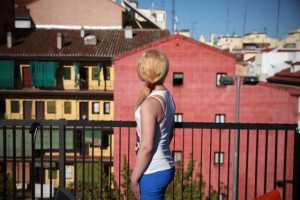 At least 57 cases of hate crime have been reported throughout Spain so far this year, says the Interior Ministry. And most of those complaints, which are now investigated in all their forms under the new penal code, are the result of Islamophobia, representing 40 percent of the total, according to police reports.
At least 57 cases of hate crime have been reported throughout Spain so far this year, says the Interior Ministry. And most of those complaints, which are now investigated in all their forms under the new penal code, are the result of Islamophobia, representing 40 percent of the total, according to police reports.
Attacks on Muslims and their property have risen in the wake of the Charlie Hebdo and related attacks in Paris in January. No prior comparable figures exist but a 2014 Interior Ministry report on incidents related to hate crime indicates that the majority of such offenses committed in Spain were the result of racism or homophobia.
Interior Ministry figures for 2014 indicate that the majority of hate crimes committed in Spain were previously the result of racism or homophobia
“Islam es paz para tu puta madre” (Islam is peace for your fucking mother) was the painted message that appeared on a mosque in Burgos on January 8, the day after the killings in Paris. The next day, a similar message was scrawled on the entrance to the Abu Bakr mosque in Madrid. And on January 10, “Islam fuera de Europa” (Islam out of Europe) was sprayed on the façade of the mosque in Jaén. Three days after that, “Fuck Islamic” (in English) was daubed on the walls of a mosque in Jeréz, along with the slogan “Je suis Charlie.”
These are visceral reactions, angry words that discriminate against an entire group based on its members’ religious and cultural feelings: they are also hate crimes, which are now categorized as such under Spain’s new penal code – before they were considered an aggravating circumstance.
The rise in reports of hate crime targeting Muslims comes amid growing media coverage of the military successes of Islamic State in Syria and Iraq, as well as attacks in Europe by so-called lone wolves, which have made the fight against Islamic terrorism one of the main objectives of police forces in Europe and the United States.
The majority of hate crimes reported in 2015 have been in Madrid (14), with six in Málaga, five in Valladolid, four in Barcelona and four in Albacete
But the Interior Ministry’s figures also include politically motivated acts of aggression, such as the incident on January 9, when a group of masked neo-Nazis stormed into the offices of Podemos in Alcalá de Henares (Madrid), attacking a member of the left-wing party before fleeing. These types of attack make up 24 percent of the hate crime cases reported this year, according to the police.
Around 31 percent of hate crimes reported so far this year were racist, such as the case in Albacete on February 5, when two Moroccan residents lodged a complaint with police about a neighbor who had repeated insulted them.
Attacks against homosexuals make up just three percent of reports in 2015: in August, the police received three such complaints, including an assault against a transsexual in Madrid. “Don’t let her pass, it’s a man, a transvestite, a faggot,” the attackers reportedly told their victim before punching her and yanking her hair.
Anti-Semitic hate crimes comprise two percent of the total number of complaints made to police so far this year.
The majority of hate crimes reported in 2015 have been in Madrid (14), with six in Málaga, five in Valladolid, four in Barcelona and four in Albacete.
A 2014 Interior Ministry report on incidents related to hate crime indicates that they increased in absolute terms that year by 113 reports – 1,285 complaints, compared with 1,172 in 2013.
Clinical psychologist Sergio García Soriano explains that people commit these types of crimes because they see certain groups as “disturbing their idea of a perfect world.” One of the main problems in identifying hate crimes is proving the reason behind it is intolerance. Insults are one of the main forms of evidence, says Miguel Ángel Aguilar, a Barcelona-based public prosecutor who specializes in hate crimes. The use of words like “maricón” (queer) show that insults are discriminatory.
The 2014 shows that men make up 92.97 percent of those accused or found guilty of hate crimes, that 79.1 percent are Spanish, and that more than a third are aged between 26 and 40.
It is worth noting that last year’s Interior Ministry report also reveals that attacks against homosexuals made up the majority of complaints to the police (36.96 percent), followed by racist or xenophobic offenses (which rose from 381 to 475 between 2013 and 2014).
But if the figures so far this year are anything to go by, Spain is set to see continued attacks against people and institutions associated with Islam.
El País